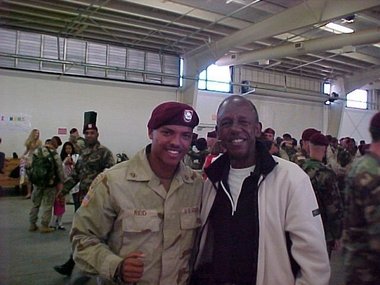Culture of Stress: Why are service members taking their lives at such an alarming rate?, 31 July 2011, Patriot-News Op-Ed
By: Mike Reid

Mike Reid, left, is shown with his father after returning from one of his deployments to Iraq. Reid grew up in the Harrisburg area and served in the Army for six years. He now lives in Georgia and works as a personal trainer
The most important thing to know about me is what I was doing during the years 2002 to 2008. In that time, I became “Army Strong” and spent nearly three of those years in Iraq.
It’s never made clear exactly what the Army slogan “Army Strong” means. I believe that I have the most accurate and truthful interpretation of what it stands for, and it has nothing to do with the commercials you see daily.
America’s service members feel the need to end their own lives at an alarming rate. It’s time we started talking about this, not to mention the increased amount of domestic violence and child abuse.
The armed forces suicide rate is double the national average. More American troops committed suicide in 2009 than died in combat in Afghanistan that same year: That is 381 suicides compared to 319 combat deaths. The statistic alone should make your stomach turn.
Those 381 suicides are spread among all four branches of the military — Army, Air Force, Marines and Navy — although 162 of them were Army soldiers. The military doesn’t count the suicides from Reservists or National Guard personnel, only active duty.
In 2010, the Army suicide number jumped up to 245, more than half of the 434 suicides militarywide. In 2011, just through the month of May, the number was already at 163 for the Army alone. The U.S. Department of Veteran Affairs says roughly 600 military and former military personnel take their own lives each year.
Now, try to stomach this one. For every suicide in the military, at least five more service members are hospitalized for attempting to kill themselves.
The question on almost everybody’s mind is, what is causing all of these American troops to do this?
FULL ARTICLE AT: http://blog.pennlive.com/editorials/print.html?entry=/2011/07/culture_of_stress_what_are_ser.html







